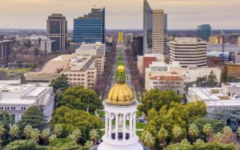
National Public Radio logo. (Photo: Public Domain)
Why Is National Public Radio Still Publicly Funded?
Mainstream Media Outlet Unabashedly Biased
By Martin Marks, April 24, 2024 4:00 am
That National Public Radio (NPR) has been historically tilted to the Left both in their opinion and news reporting is no secret. With the recent departure of a high-level editor at NPR and his blistering dressing down of the liberal media outlet in a viral essay, calls are once again heating up to defund National Public Radio from the public trough.
NPR came into existence in 1970 following the passage of the Public Broadcasting Act of 1967 which was signed into law by President Lyndon B. Johnson. This act created the Corporation for Public Broadcasting (CPB) which gave rise to National Public Radio and the Public Broadcasting Service (PBS) for television. Headquartered in Washington, D.C., NPR is a non-profit entity that syndicates over 1000 radio stations across the nation. In recent years, NPR has grown from purely a radio outlet to one that covers most mass media with digital online components with a web site, podcasts, and a Facebook and Twitter (X) presence.
At its inception NPR relied heavily on funding by the Federal Government through grants from the Corporation for Public Broadcasting, itself funded by taxpayer dollars. In the 1980’s President Ronald Reagan moved to completely wean National Public Radio from federal funding, but an internal financial crisis necessitated an influx of additional dollars in the form of a loan from the CPB to stave off bankruptcy. Today, NPR is funded through grants from foundations, sponsorships, endowments, and on-air pledge drives. NPR’s assertion that it receives less than 1% of its funding directly from the government is specious at best. To this day NPR and its syndicated stations still receive millions of dollars in annual federal funding through the CPB–which is allocated hundreds of millions of taxpayer dollars each year. In addition to the federal monies, NPR also receives grants from state and local governments.
Now, NPR finds itself on the defensive to preserve any of their taxpayer funding after Uri Berliner, a senior business editor at NPR, published a scathing rebuke of National Public Radio in an essay in the Free Press earlier this month.
In this lengthy piece, Berliner details the extreme political bias at NPR that has no doubt mushroomed since the advent of the Trump presidency. Berliner admits to NPR always having had a “liberal bent,” but with an attempt to provide some balance in reporting. No longer. Berliner writes:
“Those who listen to NPR or read its coverage online find something different: the distilled worldview of a very small segment of the U.S. population.”
Berliner does in fact point to the arrival of Donald Trump on the political scene as a turning point for NPR. They insistently pursued the Russian Collusion narrative of Trump’s campaign in 2016 and then all but ignored the story once the Robert Mueller special investigation debunked any such collusion. During the 2020 presidential campaign, NPR refused to cover the Hunter Biden laptop story at all, and ultimately we know that story had (and still has) a lot of meat on the bone. At the height of the Covid pandemic, NPR would not give any credence to the possibility that the genesis of the world-wide crisis was caused by a virus lab leak in Wuhan China as they determined that the theory was rooted in racism and born of right-wing conspiracy theorists. Subsequently, we all know that House Committee for Oversight and Accountability hearings determined that the lab leak theory was deliberately suppressed by operatives both inside and outside of government.
Berliner states that NPR joined so many other media outlets in obsessing over Diversity Equity and Inclusion (DEI) initiatives in the aftermath of the death of George Floyd at the hands of Minneapolis police officers in May of 2020. According to former CEO John Lansing, DEI was to be NPR’s “North Star” or guiding principle in all things. “Affinity Groups” based upon race, culture, gender, sexual orientation, religion, and ethnicity emerged at NPR and DEI attitudes and policies infested just about every aspect of NPR life from investigating and reporting the news to negotiating contracts with unionized NPR employees.
Berliner accuses NPR of viewing the news and reporting on same through this “intersectional lens” that has now “jumped from the faculty lounge into the newsroom.” So many stories are merely broken down into “oppressor vs oppressed.” That clearly can be seen most recently as NPR bends over backwards to highlight the plight of Palestinians in Gaza while minimizing the atrocities committed against Israel on Oct. 7, 2023.
As per Berliner, while diversity initiatives are sacrosanct, diversity of ideology is essentially nonexistent at NPR. When he did a voter records search he discovered that NPR’s Washington newsroom contained 87 Democrats and zero Republicans. And of course, their reporting reflected this. Consequently, the NPR audience has changed dramatically.
Berliner states that a little more than a decade ago, the NPR audience, while “tilted a bit to the left,” still reflected political attitudes of America at large with 26 percent of listeners describing themselves as conservative, 23 percent as middle of the road, and 37 percent as liberal.
Now those numbers have shifted dramatically with only 11 percent identifying as conservative, 21 percent as middle of the road, and 67 percent as liberal.
According to Berliner:
“An open-minded spirit no longer exists within NPR, and now, predictably, we don’t have an audience that reflects America.”
The results of NPR’s shift to transparently biased journalism have been all too predictable. Since 2017 listenership has been dropping precipitously at NPR-affiliated stations. Just last year, NPR reported a $30 million shortfall in sponsorships that necessitated a 10% reduction in employees and the elimination of their summer internship program.
For his efforts, Berliner was suspended for 5 days without pay due to his now viral essay critical of NPR. He was also threatened with termination if he did not first get approval from National Public Radio before being published at other media outlets.
Subsequently, Berliner resigned his long-time position at NPR and posted his resignation on social media. In it he wrote:
“I respect the integrity of my colleagues and wish for NPR to thrive and do important journalism. But I cannot work in a newsroom where I am disparaged by a new CEO whose divisive views confirm the very problems at NPR I cite in my Free Press essay.”
If nothing else, Uri Berliner’s essay in the Free Press has shone a light on what many already knew—NPR is an unabashedly biased media outlet masquerading as a reliable source for impartial investigation and balanced reporting of news. This, of course, would not be the first time a media outlet has been confirmed as biased.
Certainly, NPR and others like them have every right to be biased in their presentation–whether they care to admit that bias or not. Perhaps the bigger question here is should the government be funding this media outlet–to the exclusion of all others– to any extent if they are going to continue to be overtly biased? Further, when it has been clearly demonstrated that this particular media outlet less and less represents the views of most Americans, why bother propping them up financially with taxpayer dollars?
In 1983, in an effort to tighten the federal financial belt, Ronald Reagan proposed to totally cut off National Public Radio from government funding but circumstances at the time prevented seeing that to fruition. It’s high time to revisit that effort. Defund NPR.
- Time to Take The Human Touch Out Of Redistricting - January 20, 2026
- Vice President Vance Visits The Golden State - February 22, 2025
- Is DEI Ready To DIE? - January 4, 2025




To paraphrase Ronal Reagan, ” a government bureau is the nearest thing to eternal life we’ll ever see on this earth!”
Like weeds in a new lawn, the budget automatically grows, hires more people, makes more friends, and like NPR is soon becomes a pillar of free and independent thought and is honored as an indispensable appendage of our “civilized” nation.
In truth, it is a relic from the beginning of TV with roof top aerials and three TV stations. It was designed to bring highbrow entertainment to a low brow population.
NPR = National PROGRESSIVE Radio